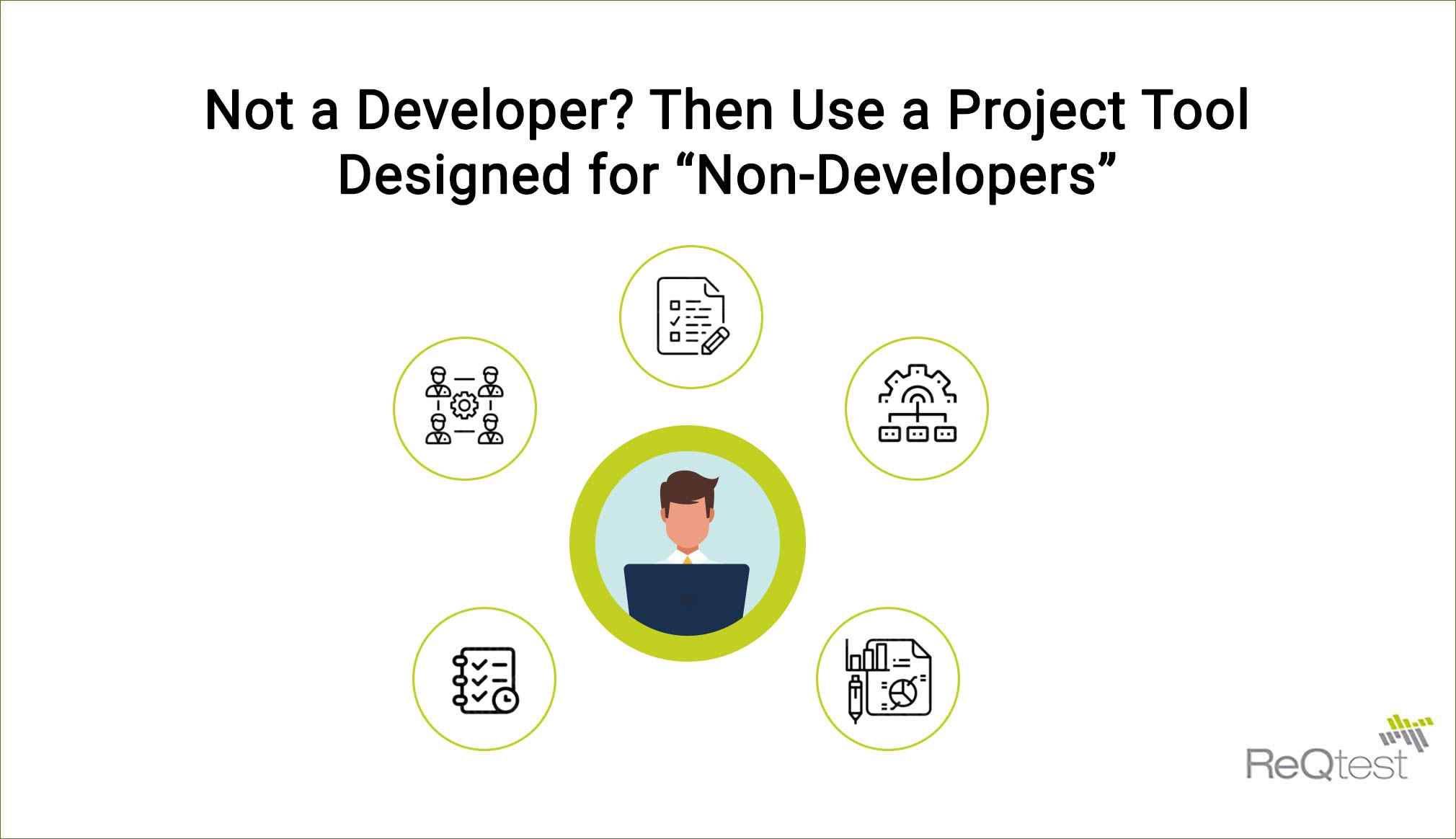February 16, 2021
Not a Developer? Then Use a Project Tool Designed for “Non-Developers”
If you are not a developer, efficient project management is still possible with the right project tool. There are specialized project software available for non-developer (non-technical people) to make it easier to communicate, collaborate, understand, and keep track of project progress.
Working in a development team requires a focus on collaboration. There are various systems that projects need to utilize to make sure that collaboration within a team remains easy for everyone to keep up with. If you are managing an IT or software project, you don’t necessarily have to understand complicated code and testing to stay on the same page as everyone else involved in the project.
The Benefits of Using a Project Tool Designed for Non-Developers
An inefficient collaboration problem can often arise in projects where non-developers have a lack of understanding with developers. This can lead to all kinds of challenges with test managers, which can affect the outcome of the project.
Below are some of the ways that using a project tool designed for non-developers can help to overcome these issues.
Easy Test Management
A really important job for QA managers is to focus on the test strategy. This includes analyzing the testing attempts to take the best steps forward.
Using a project tool designed for managing the testing directly allows for an enhanced project management strategy. These types of project tools can help non-developers to better understand the test efforts and data. This is a better solution than just focusing on managing the testers – an area where miscommunication can arise.
Better Communication
Collaboration and communication are fundamental to successful software development. This can be a challenge when different team members are on different pages – both in terms of their role in the project and with technical knowledge.
Project tools designed for non-developers allow for easy communication between everyone involved. They keep everyone up to date and on the same page with no barriers between them. Ultimately, this leads to a better result in the project.
Better Testing Insights
As a project manager or QA manager, you need to understand whether testing is effective or not. This requires accurate insights into the testing process and a look into how on-track the tests are. If you are not a developer, then understanding this kind of data and finding it yourself can be a real challenge.
Project tools specifically designed for analyzing testing can organize reports and insights so that you don’t have to find them yourself. This makes it easy for anyone, regardless of technical development knowledge, to understand the effectiveness of testing strategies.
Greater Efficiency
Using “no-code” software allows you to maximize efficiency. Processes become easier to do, projects are easier to manage, and teamwork is enhanced. This all comes together to result in valuable time-saving, which will bring your product to the market sooner.
Using project tools that don’t require code knowledge can allow anyone to test, experiment, and come up with solutions to the project easily. This prevents many barriers that can usually slow a project down, resulting in far greater efficiency across the board.
Easier Collaboration
Working in a distributed environment can make collaboration slightly challenging. When you are dealing with non-developer project managers collaborating and working with developers, this can be especially challenging.
However, tools designed for non-developers make this much easier. You can use software to easily manage collaboration from anywhere. This can help to manage simultaneous projects, run virtual meetings, and distribute tasks easily.
Just because you may lack technical knowledge, it doesn’t mean that collaboration systems should be affected.
Reports and Insights
It can be very challenging to create project reports when you are not a developer. But, there is no need for this to stop you from creating insightful reports.
Project tools can create these reports for you, making it far easier to understand the data of a project and analyze its results. Again, this makes it easy for anyone, no matter their technical knowledge, to understand the effectiveness of the project. From this, they can gain valuable insights into the direction of the project.
Saves Money
Using a project tool designed for non-developers can result in significant financial savings. It eliminates the need to hire expert help. Additionally, it allows anyone to take on technical jobs with helpful tools that don’t require technical knowledge.
This also allows businesses to try out new ideas and approaches without having to hire a developer first. As mentioned above, this type of tool can also improve efficiency. Saving time is another important way of saving money when managing a project.
Allows You to Work and Think Like a Developer
If you are a non-developer, you can still use the right project tools to help you to work as though you were one. Anyone excited about a development that lacks technical knowledge can still use these tools to understand testing processes, gain useful data insights, and work like they are a developer.
This can help to empower everyone in the team, regardless of technical knowledge. It also helps people to think in the same way and stay on the same page.
Better Integration
These types of project tools often work well with other systems and software options. This allows you to better integrate functions and systems without needing the technical knowledge to do this. In the end, you will get more efficiency and greater ease of use.
Conclusion
Project tools should always be utilized in software development projects for better management. It doesn’t matter if the project is being managed by somebody with no development knowledge. These tools are available to help everyone gain actionable insights and knowledge of the project. This leads to better communication, greater efficiency, and a smoother overall process.
The result is a stronger product, a better team, and possible financial savings. So, be sure to consider the right tool for your needs when embarking on a new project.
Share article
